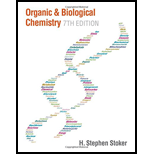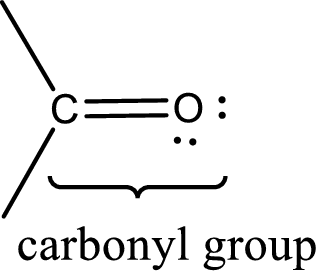
Organic And Biological Chemistry
7th Edition
ISBN: 9781305081079
Author: STOKER, H. Stephen (howard Stephen)
Publisher: Cengage Learning,
expand_more
expand_more
format_list_bulleted
Question
Chapter 4, Problem 4.116EP
Interpretation Introduction
Interpretation:
The type of compound that is obtained by replacement of the carbonyl carbon atom by a sulfur atom has to be given.
Concept Introduction:
Carbonyl groups are the one which contain a double bond between carbon and oxygen atom.

If either of the carbon atom or the oxygen atom present in the carbonyl group is substituted by sulfur atom means it is known as sulfur-containing carbonyl compounds.

Expert Solution & Answer
Want to see the full answer?
Check out a sample textbook solution
Students have asked these similar questions
Explain the reaction of aldehydes and ketones with nitrogen ?
What class of organic compound is formed when a carboxylic acid derivative reacts with an alcohol through alcoholysis?
ester
O carboxylic acid
ether
O alcohol
What class of organic compound is formed when a benzoic acid reacts with ethylamine?
O carboxylic acid
O alcohol
ester
O amide
Chapter 4 Solutions
Organic And Biological Chemistry
Ch. 4.1 - Prob. 1QQCh. 4.1 - Prob. 2QQCh. 4.2 - Prob. 1QQCh. 4.2 - Prob. 2QQCh. 4.2 - Prob. 3QQCh. 4.3 - Prob. 1QQCh. 4.3 - Prob. 2QQCh. 4.3 - Prob. 3QQCh. 4.4 - Prob. 1QQCh. 4.4 - Prob. 2QQ
Ch. 4.4 - Prob. 3QQCh. 4.4 - Prob. 4QQCh. 4.4 - Prob. 5QQCh. 4.5 - Prob. 1QQCh. 4.5 - Prob. 2QQCh. 4.5 - Prob. 3QQCh. 4.5 - Prob. 4QQCh. 4.5 - Prob. 5QQCh. 4.6 - Prob. 1QQCh. 4.6 - Prob. 2QQCh. 4.6 - Prob. 3QQCh. 4.7 - Prob. 1QQCh. 4.7 - Prob. 2QQCh. 4.8 - Prob. 1QQCh. 4.8 - Prob. 2QQCh. 4.9 - Prob. 1QQCh. 4.9 - Prob. 2QQCh. 4.10 - Prob. 1QQCh. 4.10 - Prob. 2QQCh. 4.10 - Prob. 3QQCh. 4.10 - Prob. 4QQCh. 4.11 - Prob. 1QQCh. 4.11 - Prob. 2QQCh. 4.11 - Prob. 3QQCh. 4.11 - Prob. 4QQCh. 4.11 - Prob. 5QQCh. 4.12 - Prob. 1QQCh. 4.12 - Prob. 2QQCh. 4 - Prob. 4.1EPCh. 4 - Prob. 4.2EPCh. 4 - Prob. 4.3EPCh. 4 - In terms of polarity, which carbonyl group atom...Ch. 4 - Prob. 4.5EPCh. 4 - Prob. 4.6EPCh. 4 - Prob. 4.7EPCh. 4 - Prob. 4.8EPCh. 4 - Prob. 4.9EPCh. 4 - Prob. 4.10EPCh. 4 - Prob. 4.11EPCh. 4 - Classify each of the following structures as an...Ch. 4 - Prob. 4.13EPCh. 4 - Prob. 4.14EPCh. 4 - Prob. 4.15EPCh. 4 - Prob. 4.16EPCh. 4 - Prob. 4.17EPCh. 4 - Prob. 4.18EPCh. 4 - Prob. 4.19EPCh. 4 - Prob. 4.20EPCh. 4 - Prob. 4.21EPCh. 4 - Prob. 4.22EPCh. 4 - Prob. 4.23EPCh. 4 - Prob. 4.24EPCh. 4 - Prob. 4.25EPCh. 4 - Prob. 4.26EPCh. 4 - Prob. 4.27EPCh. 4 - Prob. 4.28EPCh. 4 - Name the functional group(s) present in each of...Ch. 4 - Prob. 4.30EPCh. 4 - Prob. 4.31EPCh. 4 - Prob. 4.32EPCh. 4 - Prob. 4.33EPCh. 4 - Prob. 4.34EPCh. 4 - Prob. 4.35EPCh. 4 - Prob. 4.36EPCh. 4 - Draw a structural formula for each of the...Ch. 4 - Prob. 4.38EPCh. 4 - Prob. 4.39EPCh. 4 - Prob. 4.40EPCh. 4 - Draw a structural formula for each of the...Ch. 4 - Prob. 4.42EPCh. 4 - Prob. 4.43EPCh. 4 - Name the functional group(s) present in each of...Ch. 4 - Prob. 4.45EPCh. 4 - Prob. 4.46EPCh. 4 - Prob. 4.47EPCh. 4 - Prob. 4.48EPCh. 4 - Prob. 4.49EPCh. 4 - Give IUPAC names for all saturated...Ch. 4 - Prob. 4.51EPCh. 4 - Prob. 4.52EPCh. 4 - Prob. 4.53EPCh. 4 - Prob. 4.54EPCh. 4 - Prob. 4.55EPCh. 4 - Prob. 4.56EPCh. 4 - Prob. 4.57EPCh. 4 - Prob. 4.58EPCh. 4 - Prob. 4.59EPCh. 4 - Prob. 4.60EPCh. 4 - Prob. 4.61EPCh. 4 - Prob. 4.62EPCh. 4 - Prob. 4.63EPCh. 4 - Prob. 4.64EPCh. 4 - Which member in each of the following pairs of...Ch. 4 - Prob. 4.66EPCh. 4 - Which member in each of the following pairs of...Ch. 4 - Prob. 4.68EPCh. 4 - Prob. 4.69EPCh. 4 - How many hydrogen bonds can form between an...Ch. 4 - Prob. 4.71EPCh. 4 - Prob. 4.72EPCh. 4 - Draw the structure of the alcohol needed to...Ch. 4 - Prob. 4.74EPCh. 4 - Prob. 4.75EPCh. 4 - Prob. 4.76EPCh. 4 - Prob. 4.77EPCh. 4 - Prob. 4.78EPCh. 4 - Prob. 4.79EPCh. 4 - Prob. 4.80EPCh. 4 - Prob. 4.81EPCh. 4 - Which of the following compounds would react with...Ch. 4 - Prob. 4.83EPCh. 4 - Prob. 4.84EPCh. 4 - Which of the three compounds pentanal,...Ch. 4 - Prob. 4.86EPCh. 4 - Prob. 4.87EPCh. 4 - Prob. 4.88EPCh. 4 - Prob. 4.89EPCh. 4 - Prob. 4.90EPCh. 4 - Prob. 4.91EPCh. 4 - Indicate whether each of the following compounds...Ch. 4 - Which carbon atom is the hemiacetal carbon atom in...Ch. 4 - Which carbon atom is the hemiacetal carbon atom in...Ch. 4 - Prob. 4.95EPCh. 4 - Prob. 4.96EPCh. 4 - Prob. 4.97EPCh. 4 - Prob. 4.98EPCh. 4 - Prob. 4.99EPCh. 4 - Indicate whether each of the following compounds...Ch. 4 - Prob. 4.101EPCh. 4 - Prob. 4.102EPCh. 4 - Prob. 4.103EPCh. 4 - Prob. 4.104EPCh. 4 - Prob. 4.105EPCh. 4 - Prob. 4.106EPCh. 4 - Prob. 4.107EPCh. 4 - Name each of the compounds in Problem 15-106 in...Ch. 4 - Prob. 4.109EPCh. 4 - Prob. 4.110EPCh. 4 - Prob. 4.111EPCh. 4 - Prob. 4.112EPCh. 4 - Prob. 4.113EPCh. 4 - Prob. 4.114EPCh. 4 - Prob. 4.115EPCh. 4 - Prob. 4.116EPCh. 4 - Prob. 4.117EPCh. 4 - Prob. 4.118EP
Knowledge Booster
Similar questions
- give an example of an oxidation reaction of hexanal that will result in the formation of a carboxylic acidarrow_forwardwhat is the oxidation of 2-propanolarrow_forwardWhat type of chemical reaction does carboxylic acid undergo in the following situations? 1. production of carboxylate salts 2. reaction with acetyl chloride 3. one of the reactants in alcohol 4. alcohol used as reactantarrow_forward
arrow_back_ios
arrow_forward_ios
Recommended textbooks for you
 Organic And Biological ChemistryChemistryISBN:9781305081079Author:STOKER, H. Stephen (howard Stephen)Publisher:Cengage Learning,
Organic And Biological ChemistryChemistryISBN:9781305081079Author:STOKER, H. Stephen (howard Stephen)Publisher:Cengage Learning, General, Organic, and Biological ChemistryChemistryISBN:9781285853918Author:H. Stephen StokerPublisher:Cengage LearningChemistry: Matter and ChangeChemistryISBN:9780078746376Author:Dinah Zike, Laurel Dingrando, Nicholas Hainen, Cheryl WistromPublisher:Glencoe/McGraw-Hill School Pub Co
General, Organic, and Biological ChemistryChemistryISBN:9781285853918Author:H. Stephen StokerPublisher:Cengage LearningChemistry: Matter and ChangeChemistryISBN:9780078746376Author:Dinah Zike, Laurel Dingrando, Nicholas Hainen, Cheryl WistromPublisher:Glencoe/McGraw-Hill School Pub Co Chemistry for Today: General, Organic, and Bioche...ChemistryISBN:9781305960060Author:Spencer L. Seager, Michael R. Slabaugh, Maren S. HansenPublisher:Cengage Learning
Chemistry for Today: General, Organic, and Bioche...ChemistryISBN:9781305960060Author:Spencer L. Seager, Michael R. Slabaugh, Maren S. HansenPublisher:Cengage Learning
 World of Chemistry, 3rd editionChemistryISBN:9781133109655Author:Steven S. Zumdahl, Susan L. Zumdahl, Donald J. DeCostePublisher:Brooks / Cole / Cengage Learning
World of Chemistry, 3rd editionChemistryISBN:9781133109655Author:Steven S. Zumdahl, Susan L. Zumdahl, Donald J. DeCostePublisher:Brooks / Cole / Cengage Learning

Organic And Biological Chemistry
Chemistry
ISBN:9781305081079
Author:STOKER, H. Stephen (howard Stephen)
Publisher:Cengage Learning,

General, Organic, and Biological Chemistry
Chemistry
ISBN:9781285853918
Author:H. Stephen Stoker
Publisher:Cengage Learning

Chemistry: Matter and Change
Chemistry
ISBN:9780078746376
Author:Dinah Zike, Laurel Dingrando, Nicholas Hainen, Cheryl Wistrom
Publisher:Glencoe/McGraw-Hill School Pub Co

Chemistry for Today: General, Organic, and Bioche...
Chemistry
ISBN:9781305960060
Author:Spencer L. Seager, Michael R. Slabaugh, Maren S. Hansen
Publisher:Cengage Learning


World of Chemistry, 3rd edition
Chemistry
ISBN:9781133109655
Author:Steven S. Zumdahl, Susan L. Zumdahl, Donald J. DeCoste
Publisher:Brooks / Cole / Cengage Learning